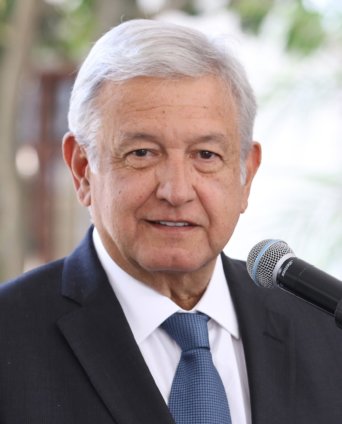- About
- Topics
- Story
- In-Depth
- Picks
- Opinion
- News
- Donate
- Signup for our newsletterOur Editors' Best Picks.Send
Read, Debate: Engage.
| topic: | Election |
|---|---|
| located: | Mexico |
| editor: | Magdalena Rojo |
Last year, on December 1, Mexico inaugurated the first leftist president in its history. Hundreds of thousands of people from across the country, including 200 world leaders, arrived in Mexico City’s main square, Zócalo, to participate in a unique ceremony directed by indigenous peoples. The ritual that they performed as they passed the symbolic Baton of Power to the new president was a hint suggesting his political agenda.
The former mayor of Mexico City, who ran for the presidential office three times in a row, presented himself as a social president who will put in place policies to help the most vulnerable in Mexican society.
He has been successful in delivering these promises. Many social programmes for the poor, seniors as well as youth have been put in place. And the help is also more direct than ever before.
Another popular measure was the strategy against the ongoing fuel theft of the public oil company Pemex. The thefts caused the state to lose 56,000 barrels a day before AMLO cut their supply. After that, the loss has been reduced to 8,000 barrels per day.
On the other hand, during his speech at the celebration of his one year in office, AMLO had to admit that he failed to achieve the economic growth he aimed for. The Mexican economy has been stagnant, however, many experts are warning that another global economic crisis might be around the corner, which might be the reason for stagnation.
Critics and the international media mostly talk about the growing number of homicides; only in the first half of this year, more than 17,000 murders were reported, which was more than last year. While social programs being put in place are a strategy to prevent violence in the country, the violence rates are not a result of a year of AMLO's presidency but of various long ongoing issues.
Among the most difficult moments during his first year, AMLO mentioned the recent murder of three women and six children of a family, with dual Mexican-US citizenships, in northern Mexico as well as the confrontation in Culiacán, Sinaloa, in October that resulted in a failed operation to detain Ovidio Guzmán, the son of one Mexico's biggest drug lords "El Chapo" Guzmán. The latter one cost AMLO popularity. While before the event, he had the support of about 80 per cent of the population, after the confrontation, it fell to 50 to 60 per cent, according to the polls.
There were other important issues that raised controversial opinions among the public as well as experts. Among them was the intent to reduce migration from Central American states towards the US after pressure from President Trump, granting political asylum to Bolivian president Evo Morales, lowering the budget on culture, and lame anti-corruption measures until now.
Yet, one year of presidency is definitely not enough to evaluate the steps any president has taken to fulfil his promises. And many Mexicans know it. For AMLO though, a year was enough to attract hundreds of thousands of people to the capital to celebrate his presidency, and those people did let him know in unison that he is not alone.
